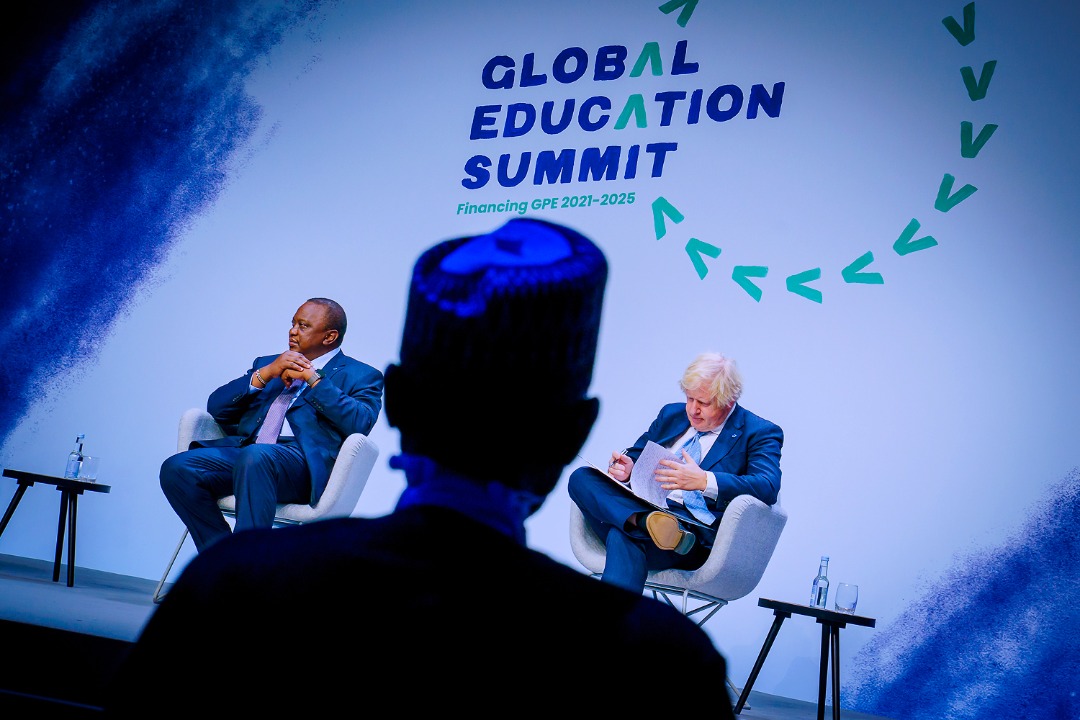At the Global Education Summit (GES) in London, held recently, President Muhammadu Buhari, along with 18 other Heads of State and government, committed to spending at least 20 per cent of their national budgets on education.
This means that in the next five years, Nigeria and the other 18 countries would commit up to US$196 billion in education financing. These commitments are a crucial shield against learning losses resulting from the economic impact of COVID-19.
The London summit, co-hosted by UK Prime Minister Boris Johnson and Kenya’s President Uhuru Kenyatta, raised a record of over US$4 billion from donors for the Global Partnership for Education (GPE). The whole essence of the US$4 billion GPE fundraising is to transform education for up to 175 million of the world’s most vulnerable children by 2025.
The two-day hybrid event brought together leaders from governments, businesses, private foundations and development banks to commit funding and support to children’s education in the world’s lowest-income countries.
Cueing in, President Buhari pledged to increase Nigeria’s education expenditure by 50 per cent over the next two years and 100% by 2025. If implemented, this would reach the global benchmark of 20 per cent of public expenditure. Buhari said: “We fully endorse the call for more efficient use of resources and to significantly increase investment in education by strengthening institutions, promoting greater adoption of technology, building the capacities of our teachers and mobilising additional financial resources through legal frameworks and deliberate interventions on sustainable basis.”
We welcome the summit and commend the host for putting it together as the issue of education is crucial to any country that desires development.
However, this kind of summit ought to have been held in Nigeria long before now, organised by the government and relevant stakeholders. This is because the quality of education in the country has been on the decline long before the coronavirus pandemic. Nigeria does not need a UK-hosted summit to realise the impact of the falling standard of education and the drop in enrolment of children in schools.
In fact, apart from inadequate and dilapidated structures for learning, education in Nigeria is facing its worst crisis ever, occasioned by the attacks on schools by bandits who terrorize schools and abduct school children. Therefore, the sector requires attention.
But it must be noted that summits alone will not redeem the sector. It is heartwarming to see the president make such a commitment to funding education. The problem now is in its implementation. Nigeria has not faithfully implemented both domestic and global funding initiatives on education in the past. While the size of the nation’s budget has increased since 2016, percentage allocation to education has been on the decline. Although allocation to education in the 2021 national budget increased from 5.61 per cent in 2020 to 5.68 per cent in 2021, it was lower than the seven per cent attained in 2016, 2018 and 2019, which is why the recent commitment by the president was received by citizens with skepticism.
In the past, funds were expended on some education projects. For example, in 2015, there was the GPE-supported programme, the Nigeria Partnership for Education Project (NIPEP), funded by a US$100 million grant to improve basic education access, retention and learning in both public schools and integrated Islamiyya schools overseen by the State Universal Basic Education Board (SUBEB).
After the NIPEP closed in 2020, GPE approved a $20 million accelerated grant targeting Borno, Adamawa and Yobe states, focusing on girls and internally displaced children, as well as host and marginalized communities that are suffering from lack of access to education.
How much has been achieved with these grants. There must be a measurement mechanism to figure out the level of implementation and success as a guide to future projects on education.
The recent summit indeed provides another opportunity for Nigeria to end its learning crisis and providing quality education. That is why we urge that the commitments from the London GES should not end like the others. It should not be another talk show. Decisions and commitments made must be followed through. The federal and state governments must renew their commitments to education through increased budgeting and such monies should be released. They should also be used for the right purposes.
It is in fact a matter of national emergency for that sector to be revived. Nigerian children deserve quality education to be able to contribute to nation building and to compete with their counterparts in other parts of the world and governments across all tiers owe them that. It is time we stopped paying lip service to issues concerning education.

 Join Daily Trust WhatsApp Community For Quick Access To News and Happenings Around You.
Join Daily Trust WhatsApp Community For Quick Access To News and Happenings Around You.


